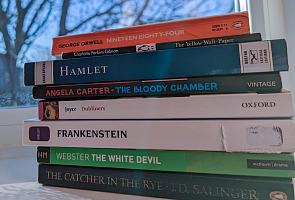BA (Hons)
English (with Integrated Foundation Year)
If you have been out of education or do not have the required A-level qualifications for degree-level study, this four-year course can help you realise your academic potential.
Content navigation menu
Why study BA English (with Integrated Foundation Year) at Goldsmiths
- Goldsmiths is dedicated to widening participation and supporting students from non-traditional backgrounds to transition to university-level study. If you do not have the required qualifications for degree-level study, our BA in English with Integrated Foundation Year offers an alternative entry route
- The Foundation Year is closely aligned with our undergraduate English programmes, teaching you a foundational knowledge of the subject, and helping you develop the academic skills necessary to progress to the first year of the BA
- You will select the undergraduate degree you wish to study at the point of application but can change your choice as you progress through the foundation pathway if your interests change
- In your Foundation Year, you will learn about significant literary movements from distinct periods, including the English Renaissance, literature of World War I, post-war drama and poetry, feminist fiction, and themes of race and class in the late 20th Century
- You will develop your ability to identify characteristics of historical periods and significant developments in literature and be able to explain the relationship of literary works to the relevant historical periods studied
- You will hone vital skills in critical reading, analysis and written communication
- Following the Foundation Year, you will go on to study one of our undergraduate English courses, which include the reading of de-colonised, feminist and multi-cultural writing, as well as classic works of the literary canon
Contact the department
If you have specific questions about the degree, contact Phyllis Richardson.
UCAS
Entry requirements
A-level: EE
BTEC: PP
Length
1 year (Foundation) followed by 3 years (Undergraduate Degree)
Fees
Home - full-time: £TBC
International - full-time: £TBC
Departments
English and Creative Writing
Centre for Academic Language and Literacies
What you'll study
Developing your academic skills
Alongside direct preparation in the study of English Literature, you will take two modules with our Centre for Academic Language and Literacies (CALL). These modules will help you develop the broader academic and research skills required for undergraduate study.
You will also learn how key social and political movements of the period have influenced the world we live in today through a cross-disciplinary module: Culture and Society in Post-war Britain. This module will cover topics such as 'Windrush and Migration', 'Irish Colonisation', 'Second-wave Feminism', 'Protest and Punk' and 'South-Asian Britain'.
| Module title | Credits |
|---|---|
| Reading and Writing Your World | 30 credits |
| Building Your Research World | 30 credits |
| Culture and Society in Postwar Britain | 30 credits |
| English Literature From the Renaissance to the Late 20th Century | 30 credits |
Note about optional modules (if available): The above is indicative of the typical modules offered, but is not intended to be construed or relied on as a definitive list of what might be available in any given year. The module content and availability is subject to change.
Teaching style
The Foundation Year provides you with core disciplinary and academic skills, as well as acting as a supportive bridge to induct you into university life. During your studies, you will be housed and supported within the Department of English and Creative Writing to ensure you are integrated into the department's ways of working before progressing onto your undergraduate degree.
How you’ll be assessed
You’ll be assessed by a variety of methods that broaden your academic skillset. These include coursework assignments such as essays, critical commentaries, presentations and personal reflections.
Entry requirements
We accept the following qualifications:
A-level: EE
BTEC: PP
You are also required to have achieved a Level 2 qualification in GCSE English at Grade 5 or above.
For candidates who have not studied any Level 3 qualifications in the last two years, there are no formal qualifications required for admission, but you will need to demonstrate that you can benefit from the programme by undertaking an additional admissions process. This may involve an interview or request for the submission of written information used to assess suitability to study.
Alternative qualifications and experience
If you can't find your qualification here, then please visit our entry requirements page for a list of alternative qualifications.
We welcome students with a range of educational experiences. If you believe you may not meet the standard qualification requirements we would still encourage you to apply because we consider all aspects of your application when making a decision.
We’ll pay particularly careful attention to your personal statement, which is your opportunity to demonstrate your interest in the subject you’ve applied for. Your referees are also welcome to include any relevant contextual comments around your academic achievements. We’ll look at all these things when making a decision on your application, as well as your qualifications and grades.
International Qualifications
We also accept a wide range of international qualifications. Find out more about the qualifications we accept from around the world.
If English isn’t your first language, you will need an IELTS score (or equivalent English language qualification) of 6.0 to study this programme.
Fees and funding
Annual tuition fees
These are the UG fees for students starting their programme in the 2024/2025 academic year.
- Home - full-time: £TBC
- International - full-time: £TBC
If your fees are not listed here, please check our undergraduate fees guidance or contact the Fees Office, who can also advise you about how to pay your fees.
It’s not currently possible for international students to study part-time if you require a Student Visa, however this is currently being reviewed and will be confirmed in the new year. Please read our visa guidance in the interim for more information. If you think you might be eligible to study part-time while being on another visa type, please contact our Admissions Team for more information.
If you are looking to pay your fees please see our guide to making a payment.
Additional costs
In addition to your tuition fees, you'll be responsible for any additional costs associated with your programme, such as buying stationery and paying for photocopying. You can find out more about what you need to budget for on our study costs page.
There may also be specific additional costs associated with your programme. This can include things like paying for field trips or specialist materials for your assignments. Please check the programme specification for more information.
Skills and careers
Skills
Some of the skills you'll develop through your Foundation Year include:
- Effective communication in written form
- Critical reading and the ability to make useful comparisons of written texts from different genres
- Analysis of long-form text and the ability to summarise and draw meaningful conclusions
- The ability to undertake independent research of a topic or subject
Careers
Students go onto undertake a wide range of careers and further courses of study, including work in culture and media, communications, public relations, publishing, education, artistic institutions and many others.



